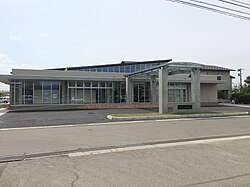Yugawa, Fukushima
Yugawa
湯川村 | |
|---|---|
 Yugawa Village Hall | |
 Location of Yugawa in Fukushima Prefecture | |
| Coordinates: 37°33′56.6″N 139°53′12.7″E / 37.565722°N 139.886861°E | |
| Country | Japan |
| Region | Tōhoku |
| Prefecture | Fukushima Prefecture |
| District | Kawanuma District |
| Area | |
| • Total | 16.36 km2 (6.32 sq mi) |
| Population (September 2014) | |
| • Total | 3,161 |
| • Density | 193/km2 (500/sq mi) |
| Time zone | UTC+9 (Japan Standard Time) |
| City symbols | |
| • Tree | Sakura (cherry blossom) |
| • Flower | Chrysanthemum |
| • Bird | Common cuckoo |
| Phone number | 0241-27-8800 |
| Address | 875-5 Oikawa Nagatoro-ko, Yugawa-mura, Kawanuma-gun, Fukushima-ken 969-3593 |
| Website | http://www.vill.yugawa.fukushima.jp/ |
Yugawa (湯川村, Yugawa-mura) is a village located in Fukushima Prefecture, Japan. As of September 2014, the village had an estimated population of 16,458, and a population density of 180 persons per km2. The total area is 91.65 km2.
Geography
Yugawa is located in the northern portion of the Aizu region of Fukushima Prefecture, in the Aizu Basin. The climate is like many other parts of northern Japan, with cold winters and snowfall averaging 2 meters.
- Rivers : Nippashi River, Agakawa RIver
Neighboring municipalities
History
The area of present-day Yugawa was part of ancient Mutsu Province. During the early Heian period, the Buddhist temple of Shōjō-ji was founded in what is now part of Yugawa village. The area formed part of the holdings of Aizu Domain during the Edo period. After the Meiji Restoration, the area was organized as part of Kawanuma District. Fukushima Prefecture.
The modern villages of Oikawa and Shōjō were created with the establishment of the municipalities system on April 1, 1889. These villages merged to form Yugawa on March 31, 1957.
Economy
The economy of Aizubange is centered on the production of rice, with much of the town area under paddy fields.
Transportation
Railway
Highway
Local attractions
- Shōjō-ji – Buddhist temple with Important Cultural Property buildings and National Treasure sculptures.
External links
![]() Media related to Yugawa, Fukushima at Wikimedia Commons
Media related to Yugawa, Fukushima at Wikimedia Commons



